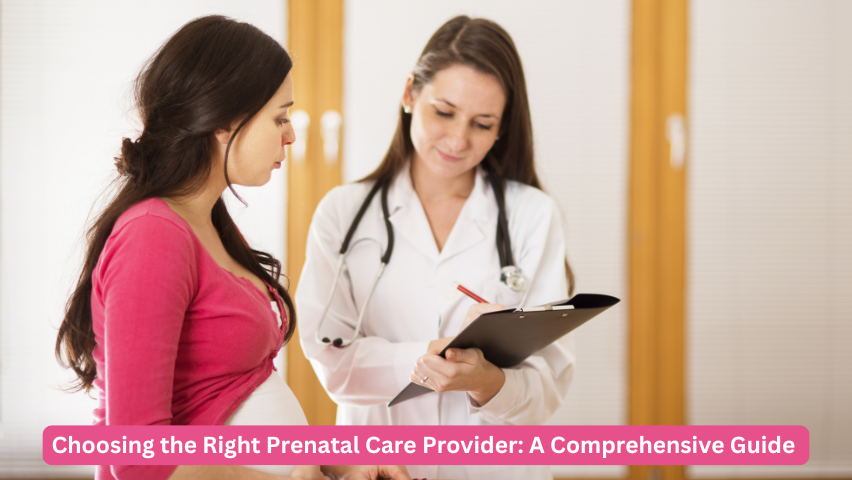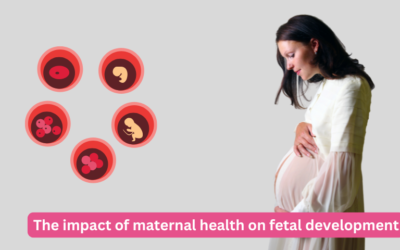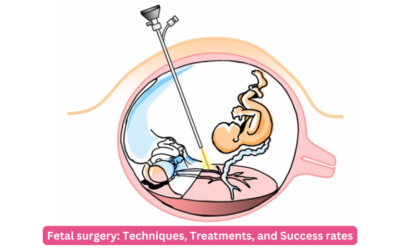Choosing the right prenatal care provider is a critical decision that significantly impacts your pregnancy journey and the health of both you and your baby. This comprehensive guide aims to help you make an informed choice, ensuring you receive the best possible care during this transformative time.
Why Prenatal Care is Essential
Prenatal care involves regular medical check-ups that monitor the progress of your pregnancy and the health of your baby. These appointments are crucial for several reasons:
- Monitoring Fetal Development: Regular ultrasounds and tests help track your baby’s growth and development.
- Identifying Health Issues Early: Conditions such as gestational diabetes or preeclampsia can be detected early, allowing for timely intervention.
- Providing Education and Support: Prenatal visits offer valuable information on nutrition, exercise, and childbirth preparation.
- Reducing Risks: Consistent care helps in managing any complications, reducing the risk of preterm labor or other adverse outcomes.
Types of Prenatal Care Providers
- Obstetrician-Gynecologist (OB-GYN) OB-GYNs are doctors specializing in women’s reproductive health, pregnancy, and childbirth. They are equipped to handle both routine and high-risk pregnancies. Their extensive training allows them to manage complications and perform surgeries such as cesarean sections if necessary.
- Midwife Midwives are trained healthcare professionals who provide care during low-risk pregnancies. They focus on a natural approach to childbirth and offer personalized support. Midwives can work in hospitals, birthing centers, or provide home birth services.
- Family Practitioner Family practitioners offer general healthcare and can provide prenatal care. They are suitable for low-risk pregnancies and can continue to care for your family after the baby is born, providing a continuity of care.
- Maternal-Fetal Medicine Specialist (Perinatologist) These are OB-GYNs with additional training in managing high-risk pregnancies. They deal with complex medical conditions and multiple pregnancies, offering advanced care and specialized treatments.
Factors to Consider When Choosing a Provider
- Credentials and Experience Verify that the provider is board-certified and has a strong background in prenatal care. Experience in handling pregnancies similar to yours is crucial, especially if you have specific health concerns or a high-risk pregnancy.
- Hospital Affiliation Check where the provider delivers babies. The hospital’s reputation for maternity care, the availability of pediatricians during labor and the overall environment are important considerations.
- Philosophy of Care Understand the provider’s approach to pregnancy and childbirth. Do they support natural birth plans? How do they handle interventions like inductions or cesarean sections? Ensure their philosophy aligns with your preferences and comfort level.
- Communication and Comfort You should feel at ease discussing your concerns with your provider. Look for someone who listens actively, respects your wishes, and provides clear, comprehensive explanations. A good rapport is essential for a positive prenatal care experience.
- Availability and Accessibility Consider the Hospital location, hours, and how easy it is to schedule appointments. Ensure they have a protocol for emergencies and after-hours concerns. Accessibility to care can significantly affect your overall experience.
How to Research and Evaluate Providers
- Ask for Recommendations Start by asking friends, family, and other healthcare professionals for recommendations. Personal experiences can provide valuable insights.
2. Research Online Use online resources to read reviews and ratings of providers.
3. Interview Potential Providers Schedule consultations with a few providers to discuss your needs and expectations. Prepare a list of questions to ensure all your concerns are addressed.
Questions to Ask Potential Providers
- What are your qualifications and experience in prenatal care?
- How do you handle high-risk pregnancies or complications?
- What is your philosophy on birth plans and interventions?
- How often will I have appointments, and what should I expect during them?
- Can I reach you or your team easily in case of an emergency?
- What is your protocol for labor and delivery, and how do you manage pain relief?
- Do you provide postpartum care and support?
Importance of Building a Supportive Prenatal Care Team
Your prenatal care team should include not only your primary provider but also other specialists as needed, such as nutritionists, lactation consultants, and pediatricians. Building a supportive team ensures comprehensive care and support throughout your pregnancy, delivery, and postpartum period.
Common Concerns and Solutions
Managing Anxiety and Stress:
Pregnancy can be a stressful time. Regular communication with your provider, prenatal yoga, and support groups can help manage anxiety.
Dealing with Morning Sickness:
Discuss effective remedies and nutritional advice with your provider to alleviate symptoms.
Understanding Your Birth Plan:
Your provider can help you create a detailed birth plan that outlines your preferences for labor and delivery, ensuring everyone is on the same page.
Conclusion
Choosing the right prenatal care provider is a personal and significant decision that impacts your entire pregnancy journey. At Shukan Hospital and IVF Center, we are committed to providing exceptional care and support. By following this guide, you can make an informed choice that ensures a healthy, positive experience for you and your baby.
Remember, you are not alone in this journey. Our team is here to support you every step of the way. Contact us today to schedule a consultation and start your path to a healthy and joyful pregnancy.
FAqs
What is the difference between an OB-GYN and a midwife?
OB-GYNs are medical doctors who can handle all aspects of pregnancy, including high-risk cases and surgeries. Midwives specialize in low-risk pregnancies and provide a more personalized and natural approach to childbirth.
Can I switch prenatal care providers if I'm not satisfied?
Yes, you can switch providers at any point if you’re not comfortable or satisfied with the care you’re receiving. It’s important to feel confident in your healthcare team.
How do I know if my pregnancy is high-risk?
Your provider will assess your health and pregnancy history to determine if you have a high-risk pregnancy. Factors can include age, medical conditions, and complications in previous pregnancies.
What should I bring to my first prenatal appointment?
Bring your medical history, a list of current medications, any previous pregnancy records, and a list of questions or concerns you may have.
How can I prepare for childbirth?
Attend prenatal classes, create a birth plan, and discuss your preferences with your provider. Learn about the stages of labor and pain management options.
How often should I have prenatal visits?
Typically, you will have visits every 3 weeks during the first 28 weeks, bi-weekly visits from 28 to 36 weeks, and weekly visits from 36 weeks until delivery. However, your provider may adjust the schedule based on your specific needs.
What tests and screenings will I need during pregnancy?
Routine tests include blood tests, urine tests, ultrasounds, and screenings for gestational diabetes, anemia, and infections. Genetic screenings and tests for chromosomal abnormalities may also be recommended based on your age and medical history.
Can I continue my regular exercise routine during pregnancy?
Most women can continue regular exercise with modifications as needed. It’s important to discuss your routine with your provider to ensure it’s safe for your pregnancy.
What should I do if I experience unusual symptoms or pain?
Contact your prenatal care provider immediately if you experience severe abdominal pain, heavy bleeding, persistent headaches, severe swelling, or any other unusual symptoms.
How can I manage common pregnancy discomforts?
Discuss strategies with your provider for managing morning sickness, back pain, heartburn, and other common discomforts. This may include dietary changes, exercise, and safe over-the-counter remedies.
What is a birth plan, and do I need one?
A birth plan outlines your preferences for labor and delivery, including pain management, who will be present, and your wishes for interventions. It’s not mandatory, but it can help ensure your preferences are known and respected.
Can I take medications during pregnancy?
Some medications are safe, while others are not recommended. Always consult your provider before taking any prescription or over-the-counter medications, supplements, or herbal remedies.
What should I know about postpartum care?
Postpartum care includes physical recovery, managing emotional changes, breastfeeding support, and follow-up visits with your provider. It’s important to address any concerns and receive support during this period.
Blogs related to Maternity
Fetal Growth Monitoring: Why it’s crucial during pregnancy?
Pregnancy is a journey of immense joy and responsibility, where the health and growth of your unborn baby become a top priority. Among the many...
Understanding HCG levels in pregnancy
Human Chorionic Gonadotropin (HCG) is a key hormone that plays a vital role in early pregnancy. Often called the "pregnancy hormone," HCG is...
Anemia and Pregnancy – What every woman should know?
Pregnancy is a life-altering experience, full of joy and excitement, but also filled with challenges and adjustments. Among the various health...
How does your body change during pregnancy?
Pregnancy is one of the most profound experiences a woman can go through, both physically and emotionally. As your body prepares to bring a new life...
How to deal with white discharge during pregnancy?
During pregnancy, the body undergoes many changes, some of which can be surprising or even concerning if you're not familiar with them. One common...
Tests during pregnancy: What are the routine prenatal tests?
Pregnancy is an exciting journey, but it can also bring a lot of questions and concerns for expecting parents. One important aspect of prenatal care...
The impact of maternal health on fetal development
Maternal health plays a crucial role in ensuring a healthy pregnancy and optimal fetal development. From the moment of conception, the health of the...
Understanding the fetal anatomy scan: What to look for?
Pregnancy is an incredible journey filled with milestones that ensure the health and well-being of both the mother and baby. One such important...
Ectopic pregnancy: Symptoms, Causes & Treatments
Ectopic pregnancy is a rare but serious condition in which a fertilized egg implants outside the uterus, most commonly in one of the fallopian...
The ethics of fetal medicine: Navigating complex decisions
Fetal medicine is a rapidly evolving field that combines advancements in technology, medical knowledge, and ethical considerations. As we strive to...
IVF and Multiple pregnancies: Understanding the risks and Benefits
In vitro fertilization (IVF) has brought hope to countless couples seeking to build families. However, one of the more complex aspects of IVF is the...
Fetal medicine and Birth planning: A professional guide to preparing for delivery
Fetal medicine plays a crucial role in modern obstetrics, offering invaluable insights into the health and development of the fetus. It enables...
Fetal surgery: Techniques, Treatments, and Success rates
Fetal surgery is a revolutionary field in medicine that addresses birth defects and other conditions while a baby is still in the womb. With...
Prenatal screening and diagnosis: Key tests and Procedures trimester by trimester
Prenatal screening and diagnostic tests are essential for monitoring the health of both the mother and baby during pregnancy. These tests help...
Advancements in fetal medicine: Latest techniques and technologies
The field of fetal medicine has experienced incredible advancements in recent years, offering pregnant women and their unborn babies more precise...
Difference between 3D and 4D sonography: Which one is right for you?
Sonography has become an integral part of prenatal care, helping expectant parents and doctors monitor the development of the fetus in real time....
15 foods and drinks to eat & avoid during pregnancy
Pregnancy is a special time that calls for extra attention to your diet. What you eat not only affects your health but also the development of your...
Understanding pregnancy trimesters: What to expect in each stage
Pregnancy is a remarkable journey, divided into three trimesters, each bringing its own set of changes, challenges, and milestones. At Shukan...
Preparing for Pregnancy: Essentials steps to take
At Shukan Hospital and IVF Center, we understand that preparing for pregnancy is an exciting and significant journey. Taking the right steps before...
Navigating the First Trimester: What to Expect
The first trimester of pregnancy is an exciting and transformative period, filled with anticipation and many changes. This phase, spanning from...
Managing Pregnancy Discomforts: Tips for Relief
Pregnancy is a beautiful journey that brings immense joy, but it also comes with its share of physical and emotional challenges. At Shukan Hospital...
Creating a Birth Plan: Your Guide to Personalized Care
Creating a birth plan is an empowering step in your pregnancy journey, allowing you to outline your preferences and make informed decisions about...
Common Pregnancy Myths: Debunking Misconceptions
We know that pregnancy is an exciting and emotional journey. With all the advice and stories you hear from friends, family, and even strangers, it...
The Art of Birthing: A Comprehensive Guide to Normal Delivery
Introduction Welcome to Shukan Hospital and IVF Center comprehensive guide to embracing natural childbirth. Welcoming a new life into the world...
Navigating Pregnancy Milestones: A Week-by-Week Guide
Introduction:Embarking on the miraculous journey of pregnancy is a momentous experience, and Shukan Hospital and IVF Centre proudly stands as your...
Unlocking the Power of Maternal Mental Health: A Path to Positive Pregnancy Outcomes
IntroductionMental health during pregnancy is a topic gaining significant attention in recent years. It's not just about the physical aspects of...
The Importance of Early Pregnancy Scans: Ensuring a Healthy Journey
Pregnancy is a uniquely special time, filled with excitement and joy.The wonder of early pregnancy is often accompanied by new feelings, new...
Fertility specialist or Gynecologist? Which is right for you?
When you are trying to conceive, it is understandable to wonder when and which doctor to consult. Patient confusion tends to originate from the fact...





























